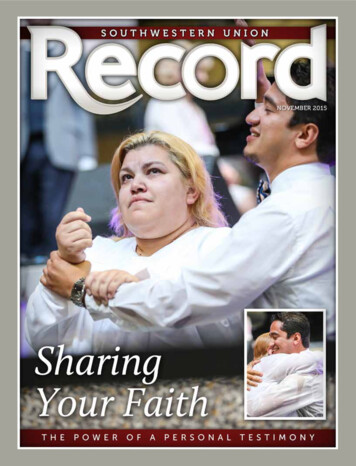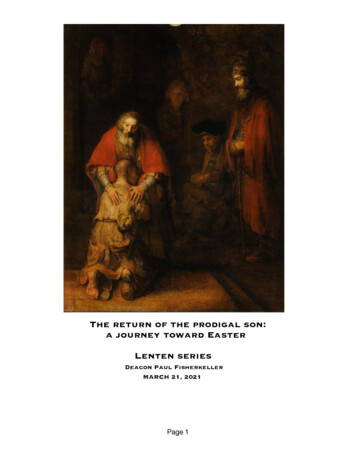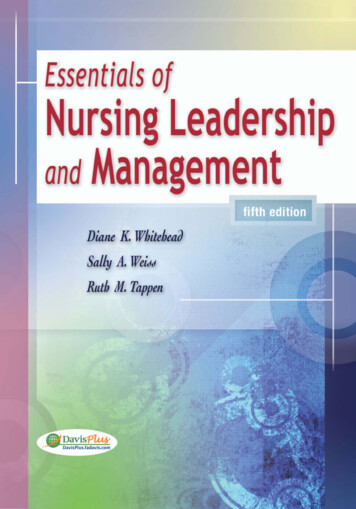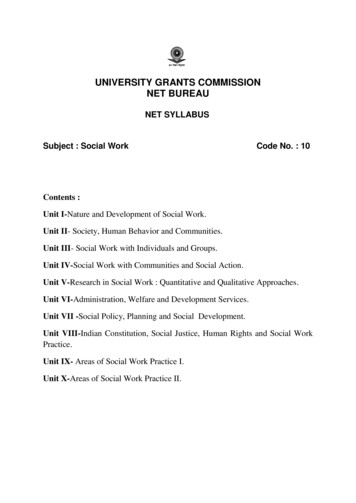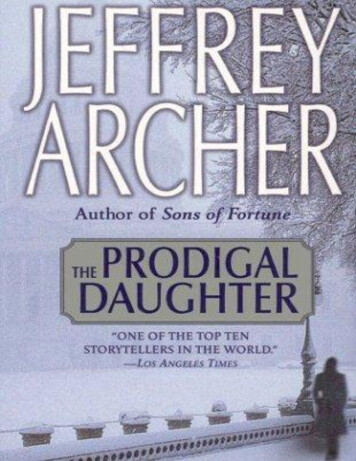
Transcription
THE PRODIGAL DAUGHTERBYJEFFREY ARCHERCORONETBOOKSHodder and Stoughton
Also by Jeffrey Archer NovelsNot a Penny More, Not a Penny LessShall We Tell the President?Kane & AbelThe Prodigal DaughterFirst Among EqualsA Matter of HonourAs the Crow FliesHonour Among ThievesThe Fourth EstateThe Eleventh CommandmentSons of FortuneSHORT STORIESA Quiver Full of ArrowsA Twist in the TaleTwelve Red HerringsThe Collected Short StoriesTo Cut a Long Story ShortPLAYSBeyond Reasonable DoubtExclusiveThe AccusedPRISON DIARIESVolume One – Belmarsh: HellVolume Two – Wayland: PurgatoryVolume Three – North Sea Camp: HeavenSCREENPLAYMallory: Walking off the Map
The publishers wish to thank April Music Limited for their kind permission to quote lyrics from JessebyJanis Ian.Copyright 1982 by Jeffrey Archer First published in Great Britain, 1982 by Hodder and StoughtonLtd Coronet edition 1983ISB NO 340329629The characters and situations in this book are entirely imagined and bear no relation to any realperson or actual happening This book is sold subject to the condition that it shall not, by way of tradeor otherwise, be lent, re-sold, hired out or otherwise circulated without the publisher’s prior consentin any form of binding (it, cover other than that in which this is published and without a similarcondition including this condition being imposed on the subsequent purchaser.PRINTED IN CANADATo Peter, Joy, Alison, Clare and Simon
Prologue“PRESIDENT OF THE UNITED STATES,” she replied.I can think of more rewarding ways of bankrupting myself,” said her father as he removed thehalf-moon spectacles from the end of his nose and peered at his daughter over the top of hisnewspaper.“Don’t be frivolous, Papa. President Roosevelt proved to us that there can be no greatercalling than public service.”“The only thing Roosevelt proved.” began her father. Then he stopped and pretended toreturn to his paper, realizing that his daughter would consider the remark flippant.The girl continued as if only too aware of what was going through her father’s mind. I realizeit would be pointless for me to pursue such an ambition without your support. My sex will be enoughof a liability without adding the disadvantage of a Polish background.”The newspaper barrier between father and daughter was abruptly removed.“Don’t ever speak disloyally of the Poles,” he said. “History has proved us to be an honorablerace who never go back on our word. My father was a baron-”“Yes, I know. So was my grandfather, but he’s not around now to help me become President.”“More’s the pity,” he said, sighing, “as he would undoubtedly have made a great leader of ourpeople.”“Then why shouldn’t his granddaughter?”“No reason at all,” he said as he stared into the steel gray eyes of his only child.“Well then, Papa, will you help me? I can’t hope to succeed without your financial backing.”Her father hesitated before replying, placing the glasses back on his nose arid slowly foldinghis copy of the Chicago Tribune.“I’ll make a deal with you, my dear-after all, that’s what politics is about. If the result of theNew Hampshire primary turns out to be satisfactory, I’ll back you to the hilt. If not, you must drop thewhole idea.”“What’s your definition of satisfactory?” came back the immediate reply.Again the man hesitated, weighing his words, “If you win the primary or capture over thirtypercent of the vote, I’ll go all the way to the convention floor with you, even if it means I end updestitute.”The girl relaxed for the first time during the conversation. “Thank you, Papa. I couldn’t haveasked for more.”“No, you certainly couldn’t,” he replied. “Now, can I get back to figuring out just how theCubs could possibly have lost the seventh game of the series to the Tigers?”“They were undoubtedly the weaker team, as the nine -three score indicates.”“Young lady, you may imagine you know a thing or two about politics, but I can assure youyou know absolutely nothing about baseball,” the man said as his wife entered the room. He turned
his heavy frame toward her. “Our daughter wants to run for President of the United States. What doyou think about that?”The girl looked up at her, eagerly waiting for a reply.“I’ll tell you what I think,” said the mother. A think it’s well past her bedtime and I blame youfor keeping her up so late. ““Yes, I suppose you’re fight, Zaphia.” He sighed. “Off you go to bed, little one.”She came to her father’s side, kissed him on the cheek and whispered, “Thank you, Papa.”The man’s eyes followed his eleven-year-old daughter as she left the room, and he noticed thatthe fingers of her fight hand were clenched, making a small, tight fist, something she always did whenshe was angry or determined. He suspected she was both on this occasion, but he realized that itwould be pointless to try to explain to his wife that their only child was no ordinary mortal. He hadlong ago abandoned any attempt to involve his wife in his own ambitions and was at least thankfulthat she was incapable of dampening their daughter’s.He returned to the Chicago Cubs and their loss of the series Prologue 3 and had to admit thathis daughter’s judgment might even be right on that subject.Florentyna Rosnovski never referred to the conversation again for twenty-two years, but whenshe did, she assumed that her father would keep his end of the bargain. After all, the Polish are anhonorable race who never go back on their word.
THE PAST: 1934-19681IT HAD NOT BEEN AN EASY BIRTH, but then for Abel and Zaphia Rosnovski nothing had everbeen easy, and in their own ways they had both become philosophical about that. Abel had wanted ason, an heir who would one day be chairman of the Baron Group. By the time the boy would be readyto take over, Abel was confident, his own name would stand alongside.those of Ritz and Statler, andby then the Barons would be the largest hotel group in the world. Abel had paced up and down thecolorless corridor of St. Luke’s General Hospital waiting for the first cry, his slight limp becomingmore pronounced as each hour passed. Occasionally he twisted the silver band that encircled hiswrist and stared at the name so neatly engraved on it.Abel had never doubted, even for a moment, that his firstborn would be a boy. He turned andretraced his steps once again, to see Dr. Dodek heading toward him.“Congratulations, Mr. Rosnovski,” he called.“Thank you,” said Abel eagerly.“You have a beautiful girl,” the doctor said as he reached him.“Thank you,” repeated Abel quietly, trying not to show his disappointment.He then followed the obstetrician into a little room at the other end of the corridor. Through anobservation window, Abel was faced with a row of wrinkled faces. The doctor pointed to thefather’s firstborn. Unlike the others, her little fingers were curled into a tight fist. Abel had readsomewhere that a child was not expected to do that for at least three weeks. He smiled, proudly.Mother and daughter remained at St. Luke’s for another six days and Abel visited them everymorning, leaving his hotel only when the last breakfast had been served, and every afternoon after thelast lunch guest had left the dining room. Telegrams, flowers and the recent fashion of greeting cardssurrounded Zaphia’s iron-framed bed, reassuring evidence that other people too rejoiced in the birth.On the seventh day mother and unnamed child-Abel had considered six boys’ names before the birthreturned home.On the anniversary of the second week of their daughter’s birth they named her Florentyna,after Abel’s sister. Once the infant had been installed in the newly decorated nursery at the top of thehouse, Abel would spend hours simply staring down at his daughter, watching her sleep and wake,knowing that he must work even harder than he had in the past to ensure the child’s future. He wasdetermined that Florentyna would be given a better start in life than he had had. Not for her the dirtand deprivation of his childhood or the humiliation of arriving on the Eastern Seaboard of America asan immigrant with little more than a few valueless Russian rubles sewn into the jacket of an only suit.He would ensure that Florentyna was given the formal education he had lacked, not that he hada lot to complain about. Franklin 1). Roosevelt lived in the White House, and Abel’s little group ofhotels looked as if they were going to survive the Depression. America had been good to thisimmigrant.Whenever he sat alone with his daughter in the little upstairs nursery he would reflect on hispast and dream of her future.
When lie had first arrived in the United States, he had found a job in a little butcher’s shop onthe lower East Side of New York, where he worked for two Jong years before filling a vacancy at thePlaza Hotel as a junior waiter. From Abel’s first day, Sarmny, the old maitre d’, had treated him asthough he were the lowest form of life. After four years, a slave trader would have been impressed bythe work and unheard-of overtime that the lowest form of life did in order to reach the exaltedposition as Sammy’s assistant headwaiter in the Oak Room. During those early years Abel spent fiveafternoons a week poring over books at Columbia University and, after dinner had been clearedaway, read on late into the night.His rivals wondered when he slept.Abel was not sure how his newly acquired sheepskin could advance him while he still onlywaited on tables in the Oak Room. The question was answered for him by a well-fed Texan namedDavis Leroy, who had watched Abel serving guests 9 solicitously for a week. Mr. Leroy, the ownerof eleven hotels, then offered Abel the position of assistant manager at his flagship, the RichmondContinental in Chicago, with the sole responsibility of running the restaurants.Abel was brought back to the present when Florentyna turned over and started to thump theside of her crib. He extended a finger, which his daughter grabbed like a lifeline thrown from asinking ship. She started to bite the finger with what she imagined were teeth.When Atxl first arrived in Chicago he found the Richmond Continental badly run down. Itdidn’t take him long to discover why. The manager, Desmond Pacey, was milking the books and asfar as Abel could tell probably had been for the past thirty years. The new assistant manager spent hisfirst six months gathering together the proof he needed to nail Pacey and then presented his employerwith a dossier containing all the facts. When Davis Leroy realized what had been going on behind hisback he immediately sacked Pacey, replacing him with his new protdgd. This spurred Abel on towork even harder, and he became so convinced that he could turn the fortunes of the Richmond Grouparound that when Leroy’s aging sister put her 25 percent of the company’s stock up for sale, Abelcashed everything he owned to purchase it. Davis Leroy was touched by his young manager’spersonal -commitment to the company and proved it by appointing him managing director of thegroup.From that moment they became partners, a professional bond that developed into a closefriendship. Abel would have been the first to appreciate how hard it was for a Texan to acknowledgea Pole as an equal. For the first time since he had settled in America, he felt secure-until he found outthat the Texans were every bit as proud a clan as the Poles.Abel still couldn’t accept what had happened. If only Davis had confided in him, told him thetruth about the extent of the group’s financial trouble-who wasn’t having problems during theDepression?- between them they could have sorted something out. At the age of’ sixty-two DavisLeroy had been informed by his bank that the value of his hotels no longer covered his loan of twomillion dollars and that he would have to put up further security before the bank would agree to paythe next month’s expenses. In response to the bank’s ultimatum, Davis Leroy had had a quiet dinnerwith his daughter and retired to the Presidential Suite on the seventeenth floor with two bottles ofbourbon. Then he had opened the window and jumped. Abel would never forget standing on thecorner of Michigan Avenue at four in the morning having to identify a body he could recognize only
by the jacket his mentor had worn the previous night. The lieutenant investigating the death hadremarked that it had been the seventh suicide in Chicago that day. It didn’t help. How could thepoliceman possibly know how much Davis Leroy had done for him, or how much more AbelRosnovski had intended to do in return for that friendship in the future? In a hastily composed willDavis had bequeathed the remaining 75 percent of the Richmond Group stock to his managingdirector, writing to Abel that although the stock was worthless, 100 percent ownership of the groupmight give him a better chance to negotiate new terms with the bank.Florentyna’s eyes opened and she started to howl. Abel picked her up lovingly, immediatelyregretting the decision as he felt the darnp, clammy bottom. He changed her diaper quickly, drying thechild carefully, before making a triangle of the cloth, not allowing the big pins anywhere near herbody: any midwife would have nodded her approval at his deftness.Florentyna closed her eyes and nodded back to sleep on her father’s shoulder. “Ungratefulbrat,” he murmured fondly as he kissed her on the cheek.After Davis Leroy’s funeral Abel had visited Kane and Cabot, the Richmond Group’s bankersin Boston, and pleaded with one of the directors not to put the eleven hotels up for sale on the openmarket. He tried to convince the bank that if only they would back him, he could – given time – turnthe balance sheet from red into black. The smooth, cold man behind the expensive partner’s desk hadproved intractable. “I have responsibilities to my own clients to consider,” he had used as an excuse.Abel would never forget the humiliation of having to call a man of his own age “sir” and still leaveempty-handed. The man must have had the soul of a cash register not to realize how many peoplewere affected by his decision. Abel promised himself, for the hundredth time, that one day he wouldget even with Mr. William “Ivy League” Kane.Abel had traveled back to Chicago thinking that nothing else could go wrong in his life, only tofind the Richmond Continental burned to the ground and the police accusing him of arson. Arson itproved to be, but at the hands of Desmond Pacey bent on revenge. When arrested, he readily admittedthe crime; his only interest was the downfall of AM. Pacey would have succeeded if the insurancecompany had not come to Abel’s rescue. Until that moment, Abel had wondered if he would not havebeen better off in the Russian prisoner-of-war La he had escaped from before fleeing to America. Butthen ck turned when an anonymous backer, who, Abel concluded, must be David Maxton of theStevens Hotel, purchased the Richmond Group and offered Abel his old position as managingdirector and a chance to prove he could run the company at a profit.Abel recalled how he had been reunited with Zaphia, the self-assured girl he had first met onboard the ship that had brought them to America. How immature she had made him feel then, but notwhen they remet and he discovered she was a waitress at the Stevens.Two years had passed since then, and although the newly named Baron Group had failed tomake a profit in 1933, it lost only 23,000, greatly helped by Chicago’s celebration of its centenary,when over a million tourists had visited the city to enjoy the World’s Fair.Once Pacey had been convicted of arson, Abel had only to wait for the insurance money to bepaid before he could set about rebuilding the hotel in Chicago. He had used the interim period to visitthe other ten hotels in the group, sacking staff who showed the same pecuniary tendencies as DesmondPacey and replacing them from the long, lines of unemployed that stretched across America.
Zaphia began to resent Abel’s journeys from Charleston to Mobile, from Houston to Memphis,continually checking over his hotels in the South.But Abel realized that if he was to keep his side of the bargain with the anonymous backer,there would be little time to sit around at home, however much he adored his daughter. He had beengiven ten years to repay the bank loan; if he succeeded, a clause in the contract stipulated, he wouldbe allowed to purchase all the stock in the company for a further three million dollars. Zaphia thankedGod each night for what they already had and pleaded with him to slow down, but nothing was goingto stop Abel from trying to fulfill the contract to the letter.“Your dinner’s ready,” shouted Zaphia at the top of her voice.Abel pretended he hadn’t heard and continued to stare down at his sleeping daughter.“Didn’t you hear me? Dinner is ready.”“What? No, dear. Sorry. Just coming.” Abel reluctantly rose to join his wife for dinner.Florentyna’s rejected red eiderdown lay on the floor beside her cot. He picked up the fluffy quilt andplaced it carefully on top of the blanket that covered his daughter. He never wanted her to feel thecold. She smiled in her sleep. Was she having her first dream? Abel wondered as he switched out thelight.
2FLORENTYNA’S CHRISTENING was something everyone present was to remember-exceptFlorentyna, who slept through the entire proceedings. After the ceremony at the Holy Name Cathedralon North Wabash, the guests made their way to the Stevens Hotel, where Abel had taken a privateroom. He had invited over a hundred guests to celebrate the occasion. His closest friend, GeorgeNovak, a fellow Pole who had occupied the bunk al ove him on the ship coming over from Europe,was to be one Kum, while one of Zaphia’s cousins, Janina, was to be the other.The guests devoured a traditional ten-course dinner including pirogi and bigos while Abel satat the head of the table accepting gifts on behalf of his daughter. There was a silver rattle, US savingsbonds, a copy of Huckleberry Finn and, finest of all, a beautiful antique emerald fing from Abel’sunnamed benefactor. He only hoped that the man gained as much pleasure in the giving as his daughtershowed in the receiving. To mark the occasion, Abel presented his daughter with a large brown teddybear with red eyes.“It looks like Franklin D. Roosevelt,” said George, holding the bear up for all to see. “Thiscalls for a second christening FDR. “Abel raised his glass. “Mr. President,” he toasted-a name the bear never relinquished.‘Me party finally came to an end about 3 A.M., when Abel had to requisition a laundry cartfrom the hotel to transport all the gifts home. George waved to Abel as he headed off down LakeShore, Drive, pushing the cart before him.The happy father began whistling to himself as he recalled every moment of the wonderfulevening. Only when Mr. President fell off the cart for a third time did Abel realize how crooked hispath must have been down Lake Shore Drive. He picked up the bear and wedged it into the center ofthe gifts and was about to attempt a straighter path when a hand touched his shoulder. Abel jumpedaround, ready to defend with his life anyone who wanted to steal Florentyna’s first possessions. Hestared up into the face of a young policeman.“Maybe you have a simple explanation as to why you’re pushing a Stevens Hotel laundry cartdown Lake Shore Drive at three in the morning?”“Yes, officer,” replied Abel.“Well, let’s start with what’s in the packages.”“Other than Franklin D. Roosevelt, I can’t be certain.”The policeman immediately arrested Abel on suspicion of larceny. While the recipient of thegifts slept soundly under her red eiderdown quilt in the little nursery at the top of the house on RiggStreet, her father spent a sleepless night on an old horsehair mattress in a cell at the local jail.George appeared at the courthouse early in the morning to verify Abel’s story. . The next dayAbel purchased a maroon four-door Buick from Peter Sosnkowski, who ran a secondhand car lot inLogan Square.Abel began to resent having to leave Chicago and his beloved Florentyna even for a few days,fearing he might miss her first step, her first word or her first anything. From her birth, he hadsupervised her daily routine, never allowing Polish to be spoken in the house; he was determined
there be no trace of a Polish accent that would make her feel ill at ease in society. Abel had intentlywaited for her first word, hoping it would be “Papa,” while Zaphia feared it might be some Polishword that would reveal that she had not been speaking English to her firstborn when they were alone.“My daughter is an American,” he explained to Zaphia, “and she must therefore speak English.Too many Poles continue to converse in their own language, thus ensuring that their children spendtheir entire lives in the northwest comer of Chicago being described as ‘Stupid Polacks’ andridiculed by everyone else they come across.”“Except their own countrymen who still feel some loyalty to the Polish empire,” said Zaphiadefensively.“The Polish empire? What century are you living in, Zaphia?”“The twentieth century,” she said, her voice rising.“Along with Dick Tracy. and Famous Funnies, no doubt?”“Hardly the attitude of someone whose ultimate ambition is to return to Warsaw as the firstPolish ambassador.”“I’ve told you never to mention that, Zaphia. Never.”Zaphia, whose English remained irredeemably shaky, didn’t reply but later grumbled to hercousins on the subject and continued to speak only Polish when Abel was out of the house. She wasnot impressed by the fact, so often trotted out by Abel, that General Motors’ turnover was greater thanPoland’s budget.By 1935, Abel was convinced that America had turned the comer and that the Depression wasa thing of the past, so he decided thc time had come to build the new Chicago Baron on the site of theold Richmond Continental. He appointed an architect and began spending more time in the WindyCity and less on the. road, determined that the hotel would turn out to be the finest in the Midwest.The Chicago Baron was completed in May 1936 and opened by the Democratic mayor,Edward J. Kelly. Both Illinois senators were dancing attendance, only too aware of Abel’sburgeoning power.“Looks like a million dollars,” said Hamilton Lewis, the senior senator.“You wouldn’t be far wrong,” said Abel, as he admired the thickly carpeted public rooms, thehigh stucco ceilings and the decorations in pastel shades of green. Ile final touch had been the darkgreen embossed B that adorned everything from the towels in the bathrooms to the flag that flutteredon the top of the forty-two-story building.“This hotel already bears the hallmark of success,” said Harnilton Lewis, addressing the twothousand assembled guests, “because, my friends, it is the man and not the building who will alwaysbe known as the Chicago Baron,” Abel was delighted by the roar that went up and smiled to himself.His public relations advisor had supplied that line to the senator’s speech writer earlier in theweek.Abel felt at ease among big businessmen and senior politicians. Zaphia, however, had notadapted to her husband’s change in fortunes and hovered uncertainly in the background, drinking a
little too much champagne, and finally crept away before the dinner was served with the lame excuseabout wanting to see that Florentyna was safely asleep. Abel accompanied his flushed wife towardthe revolving door in silent irritation. Zaphia neither cared for nor understood success on Abel’sscale and preferred to ignore his new world. She was only too aware.“When I had the reception for my wedding and again for Florentyna’s christening at theStevens, the bill was covered by my backer.”“That’s hardly conclusive.”“Agreed, but I’m certain it’s Maxton, because he once offered me thc chance to run theStevens. I told him I was more interested in finding a backer for the Richmond Group, and within aweek his bank in Chicago came up with the money from someone who could not reveal their identitybecause it would clash with their day-to-day business interests.”“That’s a little more convincing. But tell- me what you have in mind for William Kane,” saidHenry as he toyed with his wineglass and waited for Abel to continue.“Something that shouldn’t take up a lot of your time, Henry, but might well prove to berewarding for you both financially and, as you hold Kane in the same high regard as I do, personally.”“I’m listening,” said Henry, still not looking up from his glass.“I want to lay my hands on a substantial shareholding in Kane’s Boston bank.”“You won’t find that easy,” said Henry. “Most of the stock is held in a family trust and cannotbe sold without his personal concurrence. ““You seem very well informed,” said Abel.“Common knowledge,” said Henry.Abel didn’t believe him. “Well, let’s start by finding out the name -of every shareholder inKane and Cabot and see if any of them are interested in parting with their stock at a priceconsiderably above par.”Abel watched Henry’s eyes light up as he began to contemplate how Much might be in thistransaction for him if he could make a deal with both sides.“If he ever found out he’d play very rough,” said Henry.“He’s not going to find out,” said Abel. “And even if he did, we’d be at least two movesahead of him. Do you think you are capable of doing the job?”“I can try. What did you have in mind?”Abel realized that Henry was trying to find out what payment might expf-,ct, but he hadn’tfinished yet. “I want a written report the first day of every month showing Kane’s shareholdings inany company, his business commitments and all details you can obtain of his private life.I want everything you come up with, however trivial it may seem.”“I repeat, that won’t be easy,” said Henry.“Will a thousand dollars a month make the task easier?”
“Fifteen hundred certainly would,” replied Henry.“A thousand dollars a month for the first six months. If you prove yourself, I’ll raise the figureto fifteen hundred.”“It’s a deal,” said Henry.“Good,” said Abel as he took his billfold from his inside pocket and extracted a check alreadymade out to cash for one thousand dollars.Henry studied the check. “You were pretty confident I would fall into line, weren’t you?”“No, not altogether,” said Abel as he removed a second check from his billfold and showed itto Henry. It was made out for fifteen hundred dollars. “If you come up with some winners in the firstsix months, you’ll only have lost three thousand overall.”Both men laughed.“Now to a more pleasant subject,” said Abel. “Are we going to win?”“The Cubs?”“No, the ulection.”“Sure. Landon is in for a whipping. The Kansas Sunflower can’t hope to beat FDR,” saidHenry. “As the President reminded us, that particular flower is yellow, has a black heart, is useful asparrot food and always dies before November.”Abel laughed again. “And how about you personally?”“No worries. The seat has always been safe for the Democrats. The difficult thing waswinning the nomination, not the election.”“I look forward to your being a congressman, -Henry.”“I’m sure vou do, Ahel. And I look forward to serving you as well as my other constituents.”Abel looked at him quizzically. “Considerably better, I should hope,” he commented as asirloin steak that almost covered the plate was placed in front of him while another glass was filledwith a C6te de Beaune 1929.The rest of the lunch was spent discussing Gabby Hartnett’s injury problems, Jesse Owens’sfour gold medals at the Berlin Olympics and the possibility that Hitler would invade Poland.“Never,” said Henry, and started to reminisce about the courage of the Poles at Mons in theGreat War.Abel didn’t comment on the fact that no Polish regiment had seen action at Mons.At two thirty-seven, Abel was back at his desk considering the problems of the PresidentialSuite and the eight thousand fresh rolls.He did not arrive home from the Baron that night until nine o’clock, only to find Florentynaalready asleep. But she woke immediately as her father entered the nursery and smiled up at him.“Presidunk, Presidunk, Presidunk.”Abel smiled. “Not me. You perhaps, but not me.” He picked up his daugNer and kissed her on
the cheek and sat with her while she repeated her one-word vocabulary over and over again.
3IN NOVENIBER 1930, Henry Osbome was elected to the United States House of Representatives forthe Ninth District of Illinois. His majority was slightly smaller than his predecessor’s, a fact thatcould be attributed only to his laziness because Roosevelt had carried every state except Vermont andMaine, and in Congress the Republicans were down to 17 senators and 103 representatives. But allthat Abel cared about was that his man had a seat in the House, and he immediately offered him thechairmanship of the Planning Committee of the Baron Group. Henry gratefully accepted.Abel channeled all his energy into building more and more hotels-with the help ofCongressman Osbome, who seemed able to fix building permits wherever the Baron next desired.The cash Henry required for these favors was always paid in used bills. Abel had no idea whatHenry did with the money, but it was evident that some of it had to be failing into the right hands, andhe had no wish to know the details.Despite his deteriorating relationship with Zaphia, Abel still wanted a son and began todespair when his wife failed to conceive. He initially blamed Zaphia, who longed for a second child,and eventually she nagged him into seeing a doctor. Finally Abel agreed and was humiliated to learnthat he had a low sperm count: the doctor attributed this to early malnutrition and told him that it wasmost unlikely he would ever father again. From that moment the subject was closed and Abel lavishedall his affection and hopes on Florentyna, who grew like a weed. The only thing in Abel’s life thatgrew faster was the Baron Group. He built a new hotel in the North, and another in the South, whilemodemizing and streamlining the older hotels a
The Prodigal Daughter First Among Equals A Matter of Honour As the Crow Flies Honour Among Thieves The Fourth Estate The Eleventh Commandment Sons of Fortune SHORT STORIES A Quiver Full of Arrows A Twist in the Tale . “Our daughter
